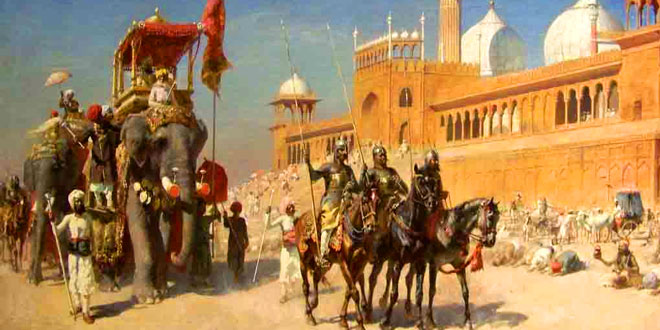Question: Describe the administration of Alaudin Khalji.
Answer: Alaudin Khalji was an able commander and an excellent administrator.
- He increased the size of the army to protect his empire. To meet the expenses, he had to find ways to add to his revenue. He confiscated all rent free land holdings that had been given to priests and government officials.
- The government officials were forbidden to collect charges from peasants. The peasants paid revenue was raised to half of the total produce.
- In this way he was able to build a rich treasury. The Sultan also put a check on the price of commodities, so that the soldiers live within their incomes.
- To prevent conspiracy among the nobles Alaudin Khalji banned all banquets and assemblies. He also enlarged the system of espionage and spread his spies across the empire.
- Alaudin transformed the markets of Delhi. He set up different markets for food grains, horses, cattle and imported goods. The weights and balances of the merchants were checked regularly.
- Alaudin also made arrangements to store large quantities of grain to be used in times of need.
Question: Write an essay on the strength and the weaknesses of Mohammad bin Tughlaq?
Answer: Mohammad-bin-Tughlaq is known as confused genius. He was capable administrator and commander and a good scholar. However he’s a man who thought ‘ahead of the times’. His plans and intentions were good but carried out throughtlessly and in a hurry, which resulted in their failure.
Shifting of the Capital:
In 1327 CE, Mohammad-bin-Tughlaq decided to shift the capital from Delhi to Daulatabad or Devagiri. On paper, it was sensible idea because it was at the centre of the empire. But the project failed, because of 2 reasons. First, he ordered his entire population shift to Daultabad which caused a great hardship to people. Second, he left the north-western frontiers of the empire exposed to the attacks of the mongols.
Taxation in Delhi:
Mohammad bin Tughlaq needed money to carry out his various plans. In order to raise money he increased the land tax near the Ganga-Yamuna region. It was proved to be ill-timed because Doab region was having a great famine. Farmers faced untold misery and riots broke out. The Sultan had to withdraw his order.
Token Currency:
In 1330 CE, The Sultan issued token currency which were of brass and copper. The experiment ended in disaster because people started mining coins at home, which caused chaos in trade and commerce. The Sultan had to withdraw the coins to exchange for silver coins.
Expedition to North-West:
In 1337-38 CE, Mohammad bin Tughlaq took an expedition to China and Qarachil in the Kumaun- Garhwal region of the Himalayas. It was another disaster.
All these schemes were basically sound, but suffered from lack of proper planning. They caused only suffering to his country and his subjects.
 Class Notes NCERT Solutions for CBSE Students
Class Notes NCERT Solutions for CBSE Students



My book is From orient Black Swan and my chapter name is The Delhi Sultanate.. I was surprised when I saw that NCERT have the same questions which I have it… Only some
Hi – your site is good and knowledgeable but our teacher has said us that you have to write the same answers he will tell students to mark, in KC Public School.
ITS VERY INFORMATIVE. I AM FROM B.D.M.I. AS I WAS READING MY HISTORY BOOK I COULD NOT FIND THE ANSWERS, SO WHEN I BROWSED HERE I FOUND IT…
Nice! Same question answer from my book (The Maurya school)